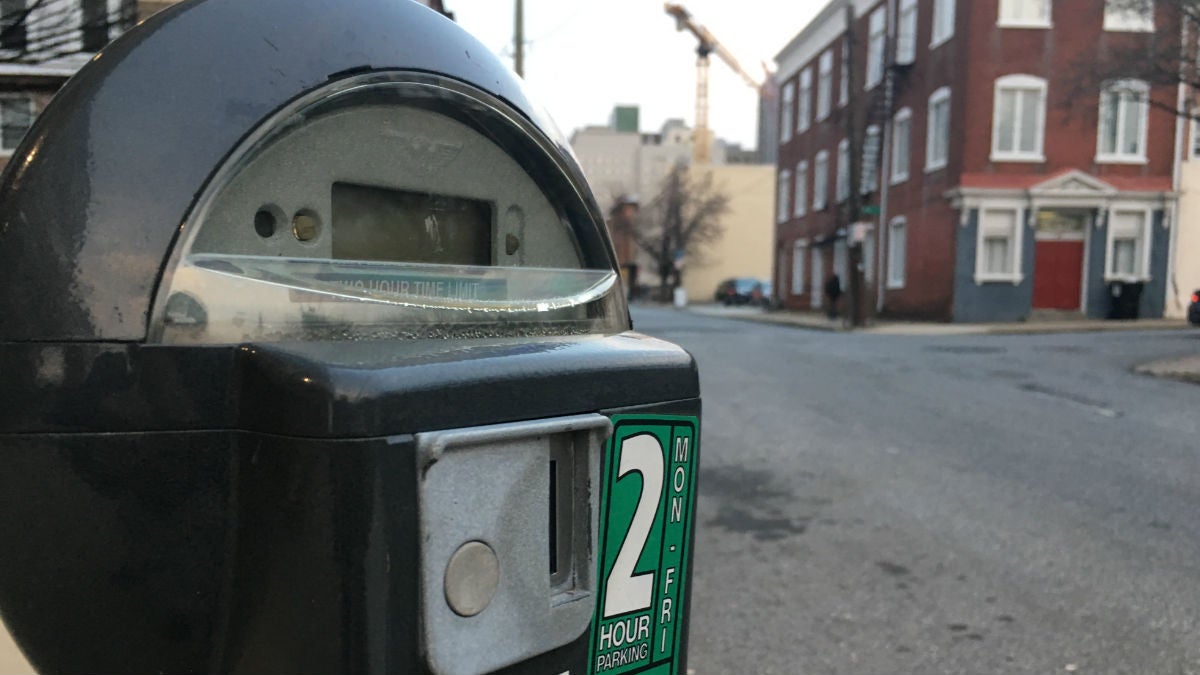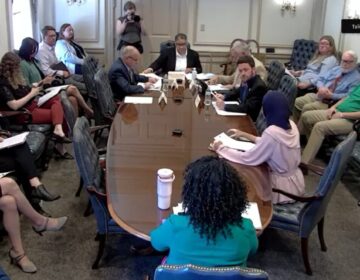Inefficiencies found in Wilmington’s parking system

(Mark Eichmann/WHYY)
AAA is investigating several inefficiencies within the city of Wilmington’s parking ticket and appeals system.
When Susan Feely believed she was incorrectly issued a parking ticket in Wilmington in June 2015 she decided to go through the appeals process with the city’s constituent services office.
What she didn’t realize was that a process that’s supposed to take about 60 days would take more than a year to resolve—and would result in late fees despite being told she wouldn’t owe any during an appeal.
“I have the least problem with the person who ticketed me—people make mistakes,” Feely said. “It’s everything that happened afterward—the total mismanagement in that office.”
She’s one of several motorists who say they’ve been wronged by Wilmington’s parking and appeals system, according to AAA Mid-Atlantic.
Several motorists say they were told their ticket had been dismissed or reversed to later learn it had not—and not only did they owe a fine for the ticket, but also late fees. Others have even paid for the same ticket multiple times. Many of these individuals didn’t learn of the fees they owed until trying to renew their registration at the Department of Motor Vehicles.
An audit of the parking and appeals system shows out-of-date parking systems and an unresponsive appeals process.
“We’re reasonably asking why these issues have gone unaddressed, especially at a time when everyone wants to make Wilmington more inviting, including bringing parking up to par with the likes of less-populated cities in the state,” said Cathy Rossi, vice president of public and government affairs for AAA Club Alliance, in a statement.
More than 30 members of AAA and the general public have been contacting the company with questions about broken parking meters and the appeals process in Wilmington. In response to the complaints, the motor vehicle organization filed a Freedom of Information Act request for audits of parking meters and the ticket appeals process.
The audits show there was no functioning sensor equipment for 19 months, only four of the 12 kiosks purchased by the City had been installed, there was no analysis for the purchase of new meters and management is choosing not to utilize less expensive options of meter installation that are readily available.
The estimated loss of revenue per month for broken smart meters is more than $1,182 and the estimated loss of revenue per month for broken coin meters is more than $8,318 per month.
In addition, the audit revealed the average number of days between ticket issuance and adjudication is 404 days, and of the 1,651 appeals in a one year period, there were 584 voids, including 63 with no explanation.
“Quite frankly, we were kind of shocked by the findings of the audits,” said Ken Grant, manager of public and government affairs for AAA.
“To find out from these audits the City is losing out on $11,000 a month because of the old technology they’re using, the breakdowns and repairs of meters, at least eight additional kiosks the city paid for that have not yet been put in use, to find out there’s mobile parking apps and other technology that would make it easier for the drivers and the city, and the City for whatever reasons is reluctant to engage in that technology—and the fact the average length of time to appeal a ticket is around 14 months—these are things that really need to be addressed by the City, and we’re a little dismayed so far this hasn’t happened.”
City spokeswoman Tonya Richardson said the City has been working on the issues since the audit was released to the municipality in August 2014.
“This was two years ago and we’ve had time to examine recommendations made by the auditor, as well as take specific measures with the constituent services unit, and there are specific improvements we’ve made,” she said. “We have reduced the response time for the appeals process tremendously and that’s been through improvements in oversight, management and technological improvements.”
Richardson said the unused kiosks were due to the need to alter them so individuals with disabilities can use them on the street. She also said the City is installing new technology in its operations to improve customer service.
After waiting more than 60 days for a response about her appeal. Feely said she received notice her ticket was upheld, and she had 15 days to respond to the notice to receive an appointment with the Justice of the Peace Court. She said that notice was mailed about 17 days after it was dated—forcing her to miss the 15-day deadline.
It was September when Feely returned to the city’s constituent services office to appeal the ticket again—but after making several calls to check in on her case and receiving no response she returned again in June 2016.
She said when she finally was able to speak with someone, she still didn’t receive a court date. In addition, Feely’s $40 ticket became $100, despite being told late fees don’t apply to tickets going through an appeal.
Finally, after waiting more than a year to receive a court date to resolve the issue, constituent services told her the ticket had been dismissed.
“When you have an office of constituent services, there should be some services, and there isn’t any,” Feely said. “They’re not even polite. Some changes need to be made in that office.”
Richardson said the City has taken the appeals process down to a seven-day response time, and believes management and oversight has improved.
“We’ve been responsive to the feedback we’re getting, and we’re using the internal audit as a way to address that,” Richardson said. “However, if a constituent decides to take an appeal to the next step it’s sent to the JP Court which has its own scheduling and we’re not directly involved in that process. Once we pass off the constituent’s request it’s no longer our process.”
In October, Rebecca Klug received a ticket for parking within 15 feet of a fire hydrant. Soon after, she received a letter from the Justice of the Peace stating she failed to appear for an arraignment—which she said she never received notification of—and she must attend court at a new date or face arrest.
However, Klug said when she went to the court on the date issued the building was closed. Despite the mistake, she said she was told she must travel to New Castle to see a judge to avoid arrest. Klug said she complied and paid $88 for the ticket and court fees.
“I just happened to be lucky I could drive after work and spend three hours taking care of this—that I was not someone with childcare responsibilities or elder care responsibilities or a second job or rely on transportation—or I would be subject to arrest,” she said.
Klug said after receiving help from a representative from the mayor’s office, said learned the ticket she received in October had not been submitted in the system until after she appeared in court, and was therefore waived. When investigating further, Klug said the representative found she already had paid for a 2015 ticket for parking too close to a hydrant, and he didn’t know why she received the court summon in the first place.
David Sophrin, the City’s policy director, said the municipality is working to ensure everyone involved in the ticketing and appeals process is working on the same technological platform, and that a new streamlining process should avoid these sort of issues.
Grant said Feely’s and Klug’s cases are only two of several incidents his office has been trying to resolve, and he’s still receiving anecdotes to this day.
AAA is now asking the city to implement more modern equipment, such as a mobile parking app, move Parking Enforcement from the Department of Finance back to the Department of Public Safety, dedicate revenues from meters and tickets specifically to transportation and infrastructure, conduct a review of the appeals process and create a more transparent parking ticket appeals process with a firm deadline of 120 days to resolve disputed parking tickets.
Sophrin said the City will research the practical and fiscal implications associated with the implementation of the recommendations. The City is working with AAA to identify best practices used in cities like Rehoboth Beach, Philadelphia and Washington D.C., he said. The recommendations and research will be provided to the incoming administration, Sophrin said.
“I believe everyone involved has a desire to create a process that is as transparent and customer-friendly as possible, so we hope the research we’re working on now and the best practices and recommendations AAA has provided will be considered, and move forward in the future,” he said. “AAA has been very helpful in providing research and ideas to how the city of Wilmington can be improved.”
Grant said the company is welcoming conversations with the outgoing and incoming administrations.
“There are a lot of questions that still need to be answered for these individual cases,” he said. “But at AAA we’re looking at the entire system at a whole that probably needs to be revamped and reformed in order to make things better for drivers, better for the city, and make Wilmington a more inviting place to be.”
WHYY is your source for fact-based, in-depth journalism and information. As a nonprofit organization, we rely on financial support from readers like you. Please give today.





